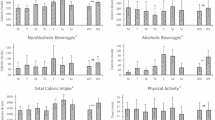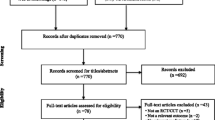Abstract
This study examined physical discomfort intolerance (DI) as a baseline predictor of weight loss and physical activity outcomes, and assessed whether changes in DI during the initial phase of weight loss prospectively predicted long-term treatment outcomes among adults enrolled in a group-based lifestyle modification program for obesity. DI was measured at baseline and 6 months, and weight and accelerometer-measured physical activity were assessed at baseline, 6 months, and 12 months. Baseline DI was not related to weight loss or physical activity at either timepoint. Change in DI during the first 6 months of treatment was not related to concurrent (i.e., 6-month) weight loss and physical activity, but was significantly predictive of weight loss and physical activity at 12 months. Assessing early changes in DI may help to identify individuals at risk for suboptimal outcomes. Future research should evaluate behavioral weight loss interventions designed to target DI.


Similar content being viewed by others
References
Baker, A., Sirois-Leclerc, H., & Tulloch, H. (2016). The impact of long-term physical activity interventions for overweight/obese postmenopausal women on adiposity indicators, physical capacity, and mental health outcomes: A systematic review. Journal of Obesity, 2016, 6169890. https://doi.org/10.1155/2016/6169890
Butryn, M. L., Kerrigan, S., Arigo, D., Raggio, G., & Forman, E. M. (2018). Pilot test of an acceptance-based behavioral intervention to promote physical activity during weight loss maintenance. Behavioral Medicine, 44, 77–87. https://doi.org/10.1080/08964289.2016.1170663
Butryn, M. L., Martinelli, M. K., Remmert, J. E., Roberts, S. R., Zhang, F., Forman, E. M., et al. (2019). Executive functioning as a predictor of weight loss and physical activity outcomes. Annals of Behavioral Medicine. https://doi.org/10.1093/abm/kaz001
Camilleri, M., Malhi, H., & Acosta, A. (2017). Gastrointestinal complications of obesity. Gastroenterology, 152, 1656–1670. https://doi.org/10.1053/j.gastro.2016.12.052
Farris, S. G., Leyro, T. M., Allan, N. P., Overup, C. S., Schmidt, N. B., & Zvolensky, M. J. (2016). Distress intolerance during smoking cessation treatment. Behaviour Research and Therapy, 85, 33–42. https://doi.org/10.1016/j.brat.2016.08.002
Guh, D. P., Zhang, W., Bansback, N., Amarsi, Z., Birmingham, C. L., & Anis, A. H. (2009). The incidence of co-morbidities related to obesity and overweight: A systematic review and meta-analysis. BMC Public Health, 9, 88. https://doi.org/10.1186/1471-2458-9-88
Leyro, T. M., Zvolensky, M. J., & Bernstein, A. (2010). Distress tolerance and psychopathological symptoms and disorders: a review of the empirical literature among adults. Psychological Bulletin, 136, 576–600. https://doi.org/10.1037/a0019712
Lillis, J., Hayes, S. C., Bunting, K., & Masuda, A. (2009). Teaching acceptance and mindfulness to improve the lives of the obese: A preliminary test of a theoretical model. Annals of Behavioral Medicine, 37, 58–69. https://doi.org/10.1007/s12160-009-9083-x
Piercy, K. L., Troiano, R. P., Ballard, R. M., Carlson, S. A., Fulton, J. E., Galuska, D. A., et al. (2018). The physical activity guidelines for Americans. JAMA, 320, 2020–2028. https://doi.org/10.1001/jama.2018.14854
Rubin, D. B. (1996). Multiple imputation after 18+ years. Journal of American Statistical Association, 91, 473–489. https://doi.org/10.1080/01621459.1996.10476908
Sacks, F. M., Bray, G. A., Carey, V. J., Smith, S. R., Ryan, D. H., Anton, S. D., et al. (2009). Comparison of weight-loss diets with different compositions of fat, protein, and carbohydrates. New England Journal of Medicine, 360, 859–873. https://doi.org/10.1056/NEJMoa0804748
Schmidt, N. B., Richey, J. A., & Fitzpatrick, K. K. (2006). Discomfort intolerance: Development of a construct and measure relevant to panic disorder. Journal of Anxiety Disorders, 20, 263–280. https://doi.org/10.1016/j.janxdis.2005.02.002
Simon, J. J., Becker, A., Sinno, M. H., Skunde, M., Bendszus, M., Preissl, H., et al. (2018). Neural food reward processing in successful and unsuccessful weight maintenance. Obesity (Silver Spring), 26, 895–902. https://doi.org/10.1002/oby.22165
Stone, A. A., & Broderick, J. E. (2012). Obesity and pain are associated in the United States. Obesity (Silver Spring), 20, 1491–1495. https://doi.org/10.1038/oby.2011.397
Wing, R. R., & Hill, J. O. (2001). Successful weight loss maintenance. Annual Review of Nutrition, 21, 323–341. https://doi.org/10.1146/annurev.nutr.21.1.323
Yuan, Y. C. (2005). Multiple imputation for missing data: Concepts and new development (Version 9.0). Cary: SAS Institute Inc.
Zheng, Y., Sereika, S. M., Danford, C. A., Imes, C. C., Goode, R. W., Mancino, J., et al. (2017). Trajectories of weight change and predictors over 18-month weight loss treatment. Journal of Nursing Scholarship, 49, 177–184. https://doi.org/10.1111/jnu.12283
Funding
This research was funded by Grant R01DK100345 (to Butryn).
Author information
Authors and Affiliations
Corresponding author
Ethics declarations
Conflict of interest
Mary K. Martinelli, Kathryn M. Godfrey, Monica Martinez, Meghan L. Butryn declares that they have no conflict of interest. Dr. Forman is a member of the Tivity Health Scientific Advisory Board.
Ethical approval
All procedures performed in studies involving human participants were in accordance with the ethical standards of the institutional and/or national research committee (include name of committee + reference number) and with the 1964 Helsinki declaration and its later amendments or comparable ethical standards.
Human and animal rights and Informed consent
All procedures followed were in accordance with ethical standards of the responsible committee on human experimentation (institutional and national) and with the Helsinki Declaration of 1975, as revised in 2000. Informed consent was obtained from all individual participants included in the study.
Additional information
Publisher's Note
Springer Nature remains neutral with regard to jurisdictional claims in published maps and institutional affiliations.
Rights and permissions
About this article
Cite this article
Martinelli, M.K., Godfrey, K.M., Martinez, M. et al. Physical discomfort intolerance as a predictor of weight loss and physical activity in a lifestyle modification program. J Behav Med 43, 1041–1046 (2020). https://doi.org/10.1007/s10865-020-00150-5
Received:
Accepted:
Published:
Issue Date:
DOI: https://doi.org/10.1007/s10865-020-00150-5




